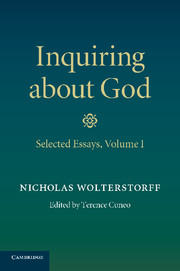Book contents
- Frontmatter
- Contents
- Editor's introduction
- Acknowledgments
- Introduction
- 1 Analytic philosophy of religion: retrospect and prospect
- 2 Is it possible and desirable for theologians to recover from Kant?
- 3 Conundrums in Kant's rational religion
- 4 In defense of Gaunilo's defense of the fool
- 5 Divine simplicity
- 6 Alston on Aquinas on theological predication
- 7 God everlasting
- 8 Unqualified divine temporality
- 9 Suffering love
- 10 Is God disturbed by what transpires in human affairs?
- 11 The silence of the God who speaks
- 12 Barth on evil
- 13 Tertullian's enduring question
- Bibliography
- Index
11 - The silence of the God who speaks
Published online by Cambridge University Press: 04 May 2010
- Frontmatter
- Contents
- Editor's introduction
- Acknowledgments
- Introduction
- 1 Analytic philosophy of religion: retrospect and prospect
- 2 Is it possible and desirable for theologians to recover from Kant?
- 3 Conundrums in Kant's rational religion
- 4 In defense of Gaunilo's defense of the fool
- 5 Divine simplicity
- 6 Alston on Aquinas on theological predication
- 7 God everlasting
- 8 Unqualified divine temporality
- 9 Suffering love
- 10 Is God disturbed by what transpires in human affairs?
- 11 The silence of the God who speaks
- 12 Barth on evil
- 13 Tertullian's enduring question
- Bibliography
- Index
Summary
Silence is of many sorts. There's the silence of the countryside on a still winter's night, when all the animals are sleeping and all the insects hibernating. There's the silence of Amsterdam on the eve of the fifth of May, when the entire old city halts for two minutes to memorialize those who fell in the war and were silenced. There's the silence of the mute, and the silence of rocks, hills, and valleys. There's silence in music, silence as essential to the music as the sounds. There's the silence of the audience chamber when the imminent entrance of the queen is announced. And there's the hush of the cosmos that the Psalmist enjoins when he announces: “The Lord is in his holy temple, let all the earth keep silence before him.”
The silence of which I will be speaking is unlike all of those. It's the silence of the biblical God – the biblical God being a God who is not only capable of speaking but also has on many occasions spoken. More specifically, I will be speaking of the biblical silence of the biblical God. The biblical silence of God is the non-answering silence of God. It's like the silence of the parent who doesn't answer when the child asks “Why? Why did it happen? Where were you?”
- Type
- Chapter
- Information
- Inquiring about God , pp. 239 - 254Publisher: Cambridge University PressPrint publication year: 2010



